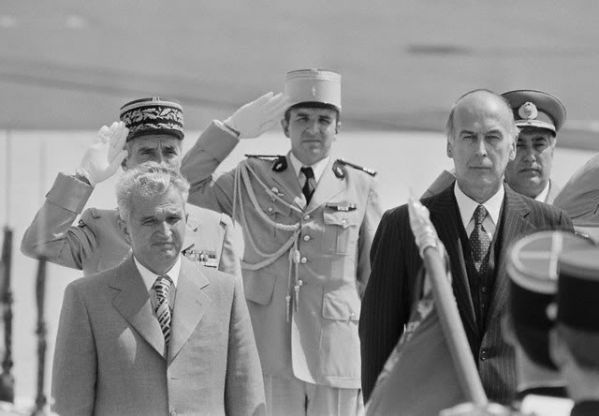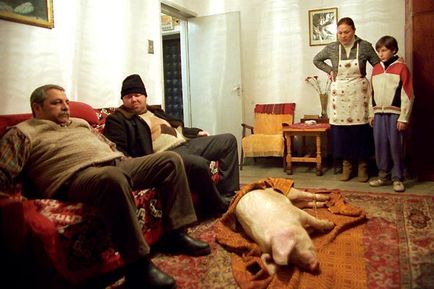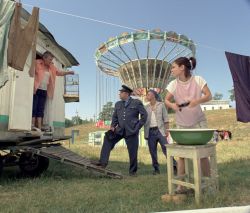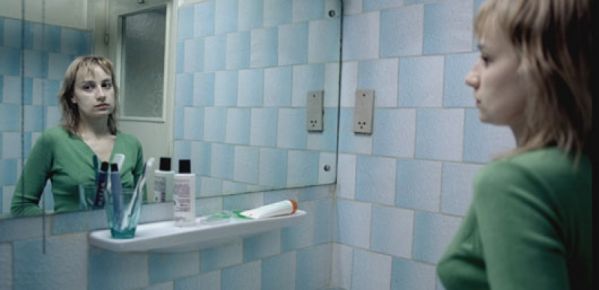Film Director Cristian Mungiu | reviews, news & interviews
Film Director Cristian Mungiu
Film Director Cristian Mungiu
From Golden Palm to Golden Age: tragi-comic myths from the reign of Ceauşescu

When an unknown Romanian director won the Palme D'Or in Cannes, you might say that it upset the applecart. Mungiu had made one small previous feature, and his winning film, 4 Months, 3 Weeks And 2 Days, was written and shot in less than a year. His, truly, was a meteoric, overnight, astonishing success.
A collection of myths, some poignant, some comic, about life in the late Eighties under Nicolae Ceauşescu, the film is written and directed by various hands. Mungiu is the project's main selling point, of course. But, in a veritable spirit of communal endeavour, he's not revealing which segments are his. And perhaps this veil of anonymity is appropriate to the source material.
Westerners generally equate the urban myth with a steaming pile of bonkers apocrypha. But Mungiu regards his "legends" more as folk tales: small kernels of fact enlarged with a succession of collective embellishments. "These stories have been related so many times that people altered them a bit and added some details. But we have no doubt that they really happened. While I was travelling around international festivals, I always had a wonderful reaction when I told them. And so I thought it would be a good concept to turn them into a film."
 Everyday life was wont to take a surreal turn under the Romanian despot, pictured here alongside Valéry Giscard d'Estaing. Ceauşescu dominated the country in various capacities for nearly three decades (the term "Golden Age" was his, and coined without a shred of irony). Fact: he was touchy about appearing shorter than visiting nabobs, resulting in hasty and sometimes highly ill-advised attempts to retouch official photographs.
Everyday life was wont to take a surreal turn under the Romanian despot, pictured here alongside Valéry Giscard d'Estaing. Ceauşescu dominated the country in various capacities for nearly three decades (the term "Golden Age" was his, and coined without a shred of irony). Fact: he was touchy about appearing shorter than visiting nabobs, resulting in hasty and sometimes highly ill-advised attempts to retouch official photographs.
"I knew a guy who worked for Scinteia, the Party newspaper, and was kicked out after one such incident." In the film, the rival dignitary dwarfing little Nicolae is the rangy French President. An alternative account claims it was the Bulgarian leader Todor Zhivkov. "It is irrelevant finally. Everybody tells the story in a different context with different details, but some of it is true."
Another tale - about a family trying to slaughter a live pig without alerting the neighbours - bears more than a passing resemblance to A Private Function, the 1984 comedy starring Michael Palin. The latter was a whimsical fantasy of post-war Britain imagined by Alan Bennett. Fact: Mungiu saw his version in the Romanian equivalent of the Police Gazette. "It has a regular column called ‘Don't Do What They Did'. I read lots of good stories there."
 The Ceauşescu reign looms large in Romanian cinema, at least the films which have made their mark in Britain such as The Death of Mr Lazarescu or12:08 East of Bucharest. Is this some kind of perverse nostalgia? "I'm not for a second nostalgic about Communism, I'm only nostalgic about my adolescence and twenties," insists Mungiu, who is 41. "Twenty years ago there were no mobiles and no internet: we had much more time to talk to each other and to think about what was happening to us and to read. A lot has changed for us since then and, the more that happens, the more you become attached to the things that have disappeared.
The Ceauşescu reign looms large in Romanian cinema, at least the films which have made their mark in Britain such as The Death of Mr Lazarescu or12:08 East of Bucharest. Is this some kind of perverse nostalgia? "I'm not for a second nostalgic about Communism, I'm only nostalgic about my adolescence and twenties," insists Mungiu, who is 41. "Twenty years ago there were no mobiles and no internet: we had much more time to talk to each other and to think about what was happening to us and to read. A lot has changed for us since then and, the more that happens, the more you become attached to the things that have disappeared.
That period is not popular, especially with local audiences. There were too many films shot about Communism and nobody really wanted to see them any longer. But I wanted to do this because I thought the stories are so strong that they would overcome that."
Fact: people collected glass bottles to redeem the tiny deposit. If you amassed enough of them - many thousands, over many years - you might one day be lucky enough to buy a rickety Dacia car. In another segment, a young couple devises an elaborate con-trick to get neighbours to part with their empty bottles, spending many hours on securing just one. "For me that episode speaks of people's desire to take the initiative and feel the adrenaline of doing something against the system. There's a line where the girl says, ‘It's not for the bottles, it's for the feeling you are doing something dangerous, escaping the grey reality of everyday.'
 "They feel a bit like Bonnie and Clyde, as if something important is happening in their lives. Everybody was feeding his imagination by watching American films on pirate videos, night after night." Mungiu himself wasn't above the odd scam. "At one point I was living from screening my collection of films to the public - I had about 200. There were no laws. It was like the Wild, Wild West."
"They feel a bit like Bonnie and Clyde, as if something important is happening in their lives. Everybody was feeding his imagination by watching American films on pirate videos, night after night." Mungiu himself wasn't above the odd scam. "At one point I was living from screening my collection of films to the public - I had about 200. There were no laws. It was like the Wild, Wild West."
Fact: one day a crowd of drunken villagers all hopped on a carousel from a visiting funfare for a joyride. Then, when the thing was in full swing, they realised that there was nobody around on the ground to switch it off. "I met the editor-in–chief of the local newspaper which reported it and he gave me all the details."
You don't need to dig very deep to see the allegories in some of these tales, the madly gyrating carousel as the image of a social order careening out of control, for example. They follow a long-established Eastern European tradition of absurdist comedy, as practised to perfection in Czech New Wave films such as Jiří Menzel's Closely Observed Trains (1966) and Milos Forman's The Fireman's Ball (1967). In Communist times such satire provided an essential safety valve for people's frustrations, while nippily dodging the attentions of the censor.
 "I really feel it was humour that kept us alive - it released the pressure for a lot of people. Harsh as the system was in the last years, everybody was telling jokes about it while they were queuing for food - it was a way of making the situation look ridiculous and being able to cope with it."
"I really feel it was humour that kept us alive - it released the pressure for a lot of people. Harsh as the system was in the last years, everybody was telling jokes about it while they were queuing for food - it was a way of making the situation look ridiculous and being able to cope with it."
This tone is in sharp contrast to 4 Months, 3 Weeks and 2 Days (starring Anamaria Marinca, left). Also set in the Ceauşescu era, it was a tough movie about a young woman and her friend securing an illegal abortion (though the controlled brilliance of Mungiu's film-making turned it into an enthralling social thriller). Tales From the Golden Age is a much lighter affair, even if some of the episodes are imbued with a romantic, even tragic melancholy. "When I was looking back at that period, it was very difficult to think of a single mood. So I decided I had to make several films."
It's a spectacular story, but I didn't think people would believe it had really happened
A total of seven stories were shot, but they are being released in different countries in different combinations, depending on what seems most likely to appeal to local audiences (Tales from the Golden Age has been sold in 30 countries thanks to Mungiu's international profile). Britain is getting five of them. The order of play can vary too depending on the territory. "Technically it's very complicated: we have to distribute each episode on a different reel. And there are four different sets of credits."
There are plenty more urban myths where those came from. "When Tales From the Golden Age was released in Romania, I launched a competition on the internet to find the best ones from the Eighties. Hundreds came in and I'm translating the best ones now so that people can read them either as a bonus on the DVD or on the film's website.
 "I'll tell you a good one. It was very difficult and expensive to transport dead bodies to be buried in their hometown and so some people offered this service more cheaply. They would buy a regular ticket for the corpse, pour lots of booze on him and carry him on to the train saying, ‘The old man drank a bit too much.'
"I'll tell you a good one. It was very difficult and expensive to transport dead bodies to be buried in their hometown and so some people offered this service more cheaply. They would buy a regular ticket for the corpse, pour lots of booze on him and carry him on to the train saying, ‘The old man drank a bit too much.'
"One day they had to take a guy to a town 15 hours from Bucharest. At one point the two people accompanying him went off to the restaurant car to have a drink and left him in the compartment with a young couple. Fifteen minutes later the train went into the mountains and started to shake, and the corpse fell forward into the young lady's lap. As her fiancé pushed him back up, the old man's head slammed against the window and he fell onto the floor."
Discovering he was dead, the couple panicked and threw him out the window. "When the escorts came back, they said, ‘So where's grandpa?' and the couple said, ‘He got off at the last station.' In the end the young man was sent to prison for killing somebody who was dead already. It's a spectacular story, but the context was so complicated to explain. And I didn't think people would believe it had really happened."
Above: At Cannes in 2007 Mungiu accepts his Palme D'Or and a congratulatory kiss from Jane Fonda.
The future of Arts Journalism
You can stop theartsdesk.com closing!
We urgently need financing to survive. Our fundraising drive has thus far raised £33,000 but we need to reach £100,000 or we will be forced to close. Please contribute here: https://gofund.me/c3f6033d
And if you can forward this information to anyone who might assist, we’d be grateful.

Subscribe to theartsdesk.com
Thank you for continuing to read our work on theartsdesk.com. For unlimited access to every article in its entirety, including our archive of more than 15,000 pieces, we're asking for £5 per month or £40 per year. We feel it's a very good deal, and hope you do too.
To take a subscription now simply click here.
And if you're looking for that extra gift for a friend or family member, why not treat them to a theartsdesk.com gift subscription?
more
 Help to give theartsdesk a future!
Support our GoFundMe appeal
Help to give theartsdesk a future!
Support our GoFundMe appeal
 Verdi Requiem, Philharmonia, Muti, RFH review – new sparks from an old flame
Discoveries on a veteran maestro's epic journey
Verdi Requiem, Philharmonia, Muti, RFH review – new sparks from an old flame
Discoveries on a veteran maestro's epic journey
 Wilko: Love and Death and Rock'n'Roll, Southwark Playhouse review - charismatic reincarnation of a rock legend
Johnson Willis captures the anarchic energy and wit of the late guitarist
Wilko: Love and Death and Rock'n'Roll, Southwark Playhouse review - charismatic reincarnation of a rock legend
Johnson Willis captures the anarchic energy and wit of the late guitarist
 The End review - surreality in the salt mine
Unsettling musical shows the lengths we go to avoid the truth
The End review - surreality in the salt mine
Unsettling musical shows the lengths we go to avoid the truth
 Album: Perfume Genius - Glory
Album seven from an artist carving out his own space in the most modernist of ways
Album: Perfume Genius - Glory
Album seven from an artist carving out his own space in the most modernist of ways
 La finta giardiniera, The Mozartists, Cadogan Hall review - blooms in the wild garden
Mozart's rambling early opera can still smell sweet
La finta giardiniera, The Mozartists, Cadogan Hall review - blooms in the wild garden
Mozart's rambling early opera can still smell sweet
 La Cocina review - New York restaurant drama lingers too long
Struggles of undocumented immigrants slaving in a Times Square kitchen
La Cocina review - New York restaurant drama lingers too long
Struggles of undocumented immigrants slaving in a Times Square kitchen
 Album: Alison Krauss & Union Station - Arcadia
Their first album in 14 years looks hard at the past, and its role in the present
Album: Alison Krauss & Union Station - Arcadia
Their first album in 14 years looks hard at the past, and its role in the present
 Batsashvili, Hallé, Wong, Bridgewater Hall, Manchester review - a star in the piano universe
The Georgian pianist brings precision and freedom to Liszt’s warhorses
Batsashvili, Hallé, Wong, Bridgewater Hall, Manchester review - a star in the piano universe
The Georgian pianist brings precision and freedom to Liszt’s warhorses
 Blu-ray: Lifeforce
Tobe Hooper's frenzied, far out space sex vampire epic
Blu-ray: Lifeforce
Tobe Hooper's frenzied, far out space sex vampire epic
 Der fliegende Holländer, Irish National Opera review - sailing to nowhere
Plenty of strong singing and playing, but the staging is static or inept
Der fliegende Holländer, Irish National Opera review - sailing to nowhere
Plenty of strong singing and playing, but the staging is static or inept

Add comment